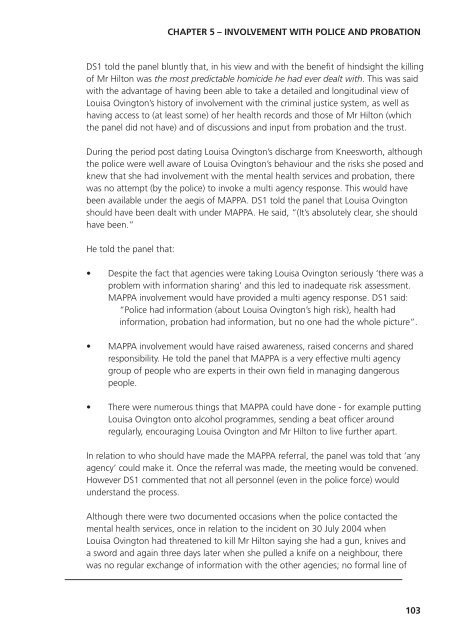Lousia Ovington independent investigation report ... - NHS North East
Lousia Ovington independent investigation report ... - NHS North East
Lousia Ovington independent investigation report ... - NHS North East
You also want an ePaper? Increase the reach of your titles
YUMPU automatically turns print PDFs into web optimized ePapers that Google loves.
DS1 told the panel bluntly that, in his view and with the benefit of hindsight the killing<br />
of Mr Hilton was the most predictable homicide he had ever dealt with. This was said<br />
with the advantage of having been able to take a detailed and longitudinal view of<br />
Louisa <strong>Ovington</strong>’s history of involvement with the criminal justice system, as well as<br />
having access to (at least some) of her health records and those of Mr Hilton (which<br />
the panel did not have) and of discussions and input from probation and the trust.<br />
During the period post dating Louisa <strong>Ovington</strong>’s discharge from Kneesworth, although<br />
the police were well aware of Louisa <strong>Ovington</strong>’s behaviour and the risks she posed and<br />
knew that she had involvement with the mental health services and probation, there<br />
was no attempt (by the police) to invoke a multi agency response. This would have<br />
been available under the aegis of MAPPA. DS1 told the panel that Louisa <strong>Ovington</strong><br />
should have been dealt with under MAPPA. He said, “(It’s absolutely clear, she should<br />
have been.”<br />
He told the panel that:<br />
CHAPTER 5 – INVOLVEMENT WITH POLICE AND PROBATION<br />
• Despite the fact that agencies were taking Louisa <strong>Ovington</strong> seriously ‘there was a<br />
problem with information sharing’ and this led to inadequate risk assessment.<br />
MAPPA involvement would have provided a multi agency response. DS1 said:<br />
“Police had information (about Louisa <strong>Ovington</strong>’s high risk), health had<br />
information, probation had information, but no one had the whole picture”.<br />
• MAPPA involvement would have raised awareness, raised concerns and shared<br />
responsibility. He told the panel that MAPPA is a very effective multi agency<br />
group of people who are experts in their own field in managing dangerous<br />
people.<br />
• There were numerous things that MAPPA could have done - for example putting<br />
Louisa <strong>Ovington</strong> onto alcohol programmes, sending a beat officer around<br />
regularly, encouraging Louisa <strong>Ovington</strong> and Mr Hilton to live further apart.<br />
In relation to who should have made the MAPPA referral, the panel was told that ‘any<br />
agency’ could make it. Once the referral was made, the meeting would be convened.<br />
However DS1 commented that not all personnel (even in the police force) would<br />
understand the process.<br />
Although there were two documented occasions when the police contacted the<br />
mental health services, once in relation to the incident on 30 July 2004 when<br />
Louisa <strong>Ovington</strong> had threatened to kill Mr Hilton saying she had a gun, knives and<br />
a sword and again three days later when she pulled a knife on a neighbour, there<br />
was no regular exchange of information with the other agencies; no formal line of<br />
103
















